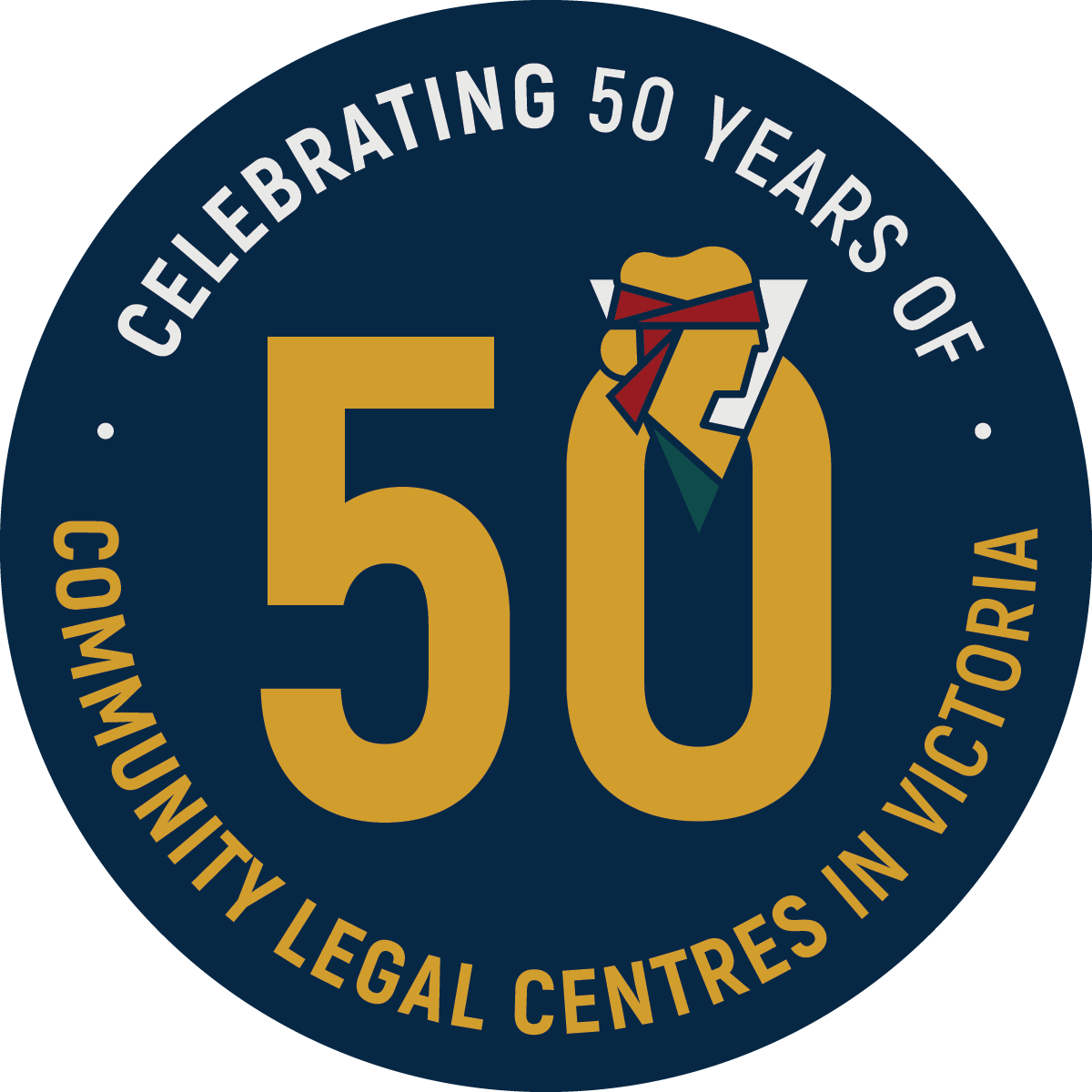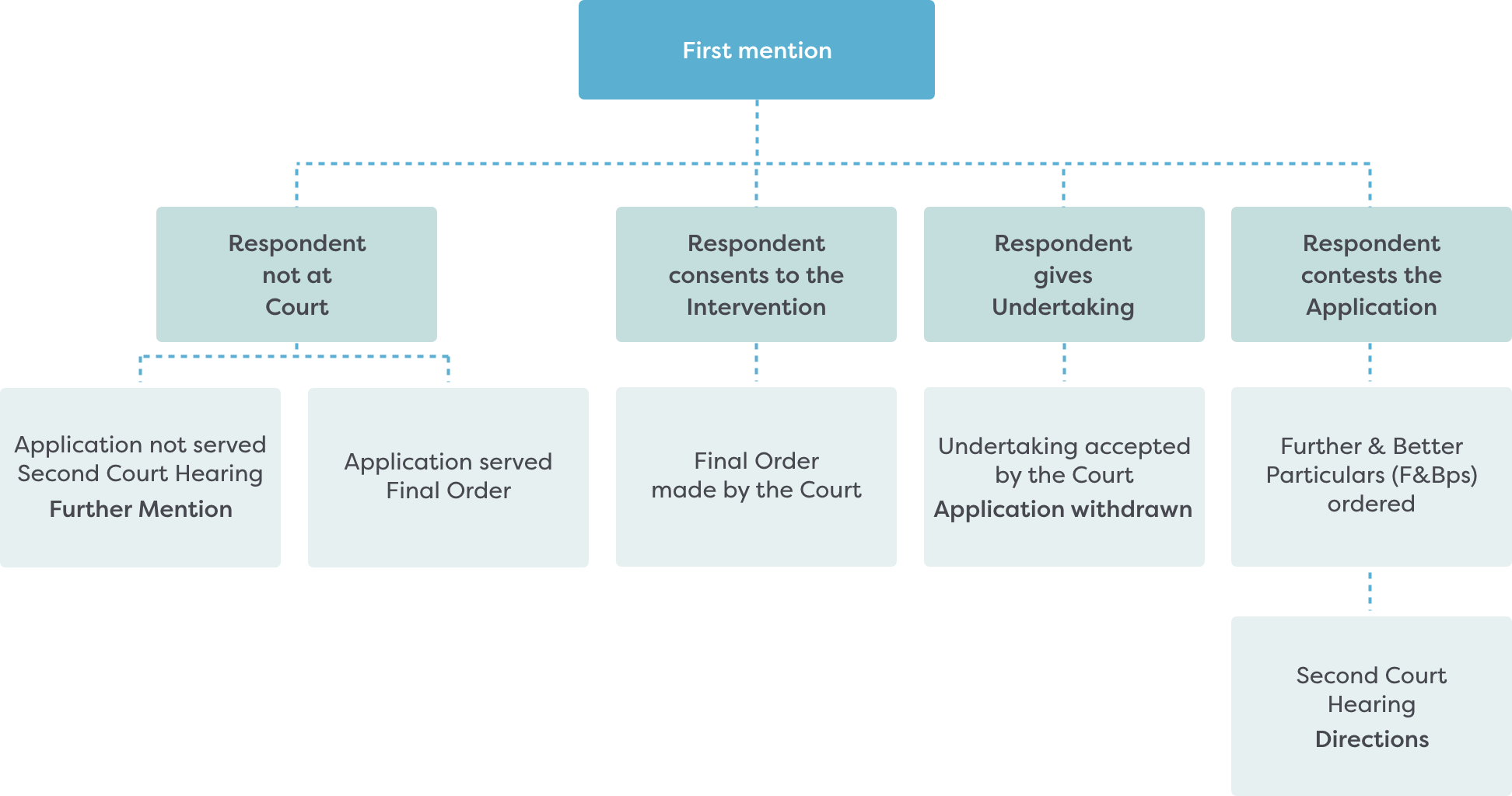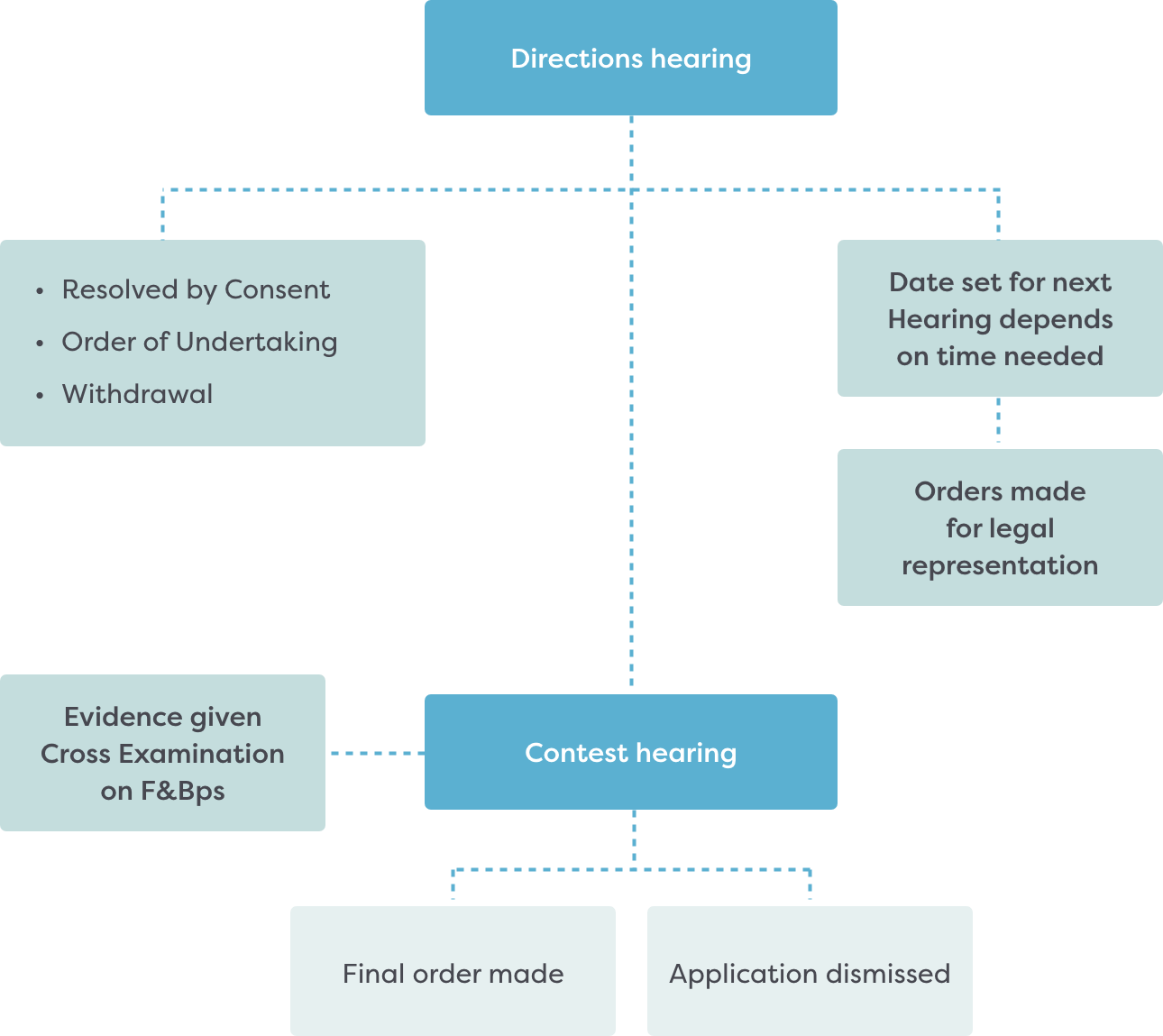



Family Violence Intervention Orders
The content on this site is information only and is not legal advice. If you need legal advice please contact us.
Learn more about protecting yourself and your family
If you find yourself in a family situation which makes you fearful, it’s critical to know where to get help, as quickly as possible. Family Violence Intervention Orders (FVIOs) can help to protect the safety of you and your family members
Family violence is violent, dominating or aggressive behaviour by one person (the Respondent) against other people in the same family (the family members). The conduct is often intimidating, manipulative or controlling. It causes the family members to fear for their safety.
Family members include:
- Spouses and former spouses
- De facto partners and former partners
- Children
- People who live in the same household
- Extended relatives
- People you treat as family members
Family violence can be physical, sexual, emotional, or financial. It can include assault, threats, property damage, and many other behaviours.
If a child hears or sees family violence, the law considers that the violence has been committed against the child.
A Family Violence Intervention Order (FVIO) is a Court Order which aims to protect family members (affected family members) by ordering a Respondent to stop being violent towards them. FVIOs were formerly known as restraining orders.
An FVIO can order the Respondent to stop the violence, stay away from the affected family members, not communicate with the affected family members, and more.
You should consider applying for an FVIO if:
- The actions of a family member cause you to fear for your safety, or the safety of other family members; and
- You believe the behaviour will continue.
If you’re in a violent situation, the quickest way to get help is to call the Police on 000.
Completing your FVIO application
If you have experienced family violence, but aren’t in immediate danger, you can apply to the Magistrates’ Court for an FVIO if it’s safe for you to do so.
The Court uses some language which you’ll need to understand:
- Applicant – is the person applying for the FVIO
- Affected family member – sometimes known as a protected person – is the person who needs the FVIO. (Sometimes the affected family member and the applicant are the same person. Sometimes the applicant makes an application on behalf of the affected family member, for example, a child)
- Respondent – is the person who the applicant says has committed family violence
- Conditions – are the rules the Court makes in its FVIO about the Respondent’s behaviour
- Interim Order – is a temporary Order. Usually, interim Orders can be made immediately and take effect as soon as the Respondent receives the paperwork. They stay in place until final Orders are made
- Final Order – is an Order that is made at a Court hearing, either by agreement between the parties or after a Magistrate has heard evidence from both sides.
You can make a FVIO application in person at the Magistrates’ Court, or online. If you need help, you can phone the Magistrates’ Court.
You will need to provide information on your application form, including:
- Your name, address and phone number
- The Respondent’s name, address and phone number
- Reasons why you’re applying for an FVIO
- The conditions you think are needed to ensure your safety and the safety of other family members
You’ll also need to swear that the contents of your application are true.
In the Barwon area, there are Magistrates’ Courts at Geelong and Colac.
You can go to a Magistrates’ Court at any time to make a FVIO application. Usually, you don’t need an appointment; you can meet with a Registrar (an officer of the Court) to go through your application.
If it’s not safe for you to go to a Court, contact the Police, or the Court to discuss your options.
It will help your application if you have evidence, for example:
- Photos of your injuries
- Police reports
- Court Orders
- Medical reports
- Text messages
- Emails and social media posts
You can give these to the Registrar as proof of what you say in your application. If you don’t have any evidence, don’t worry. You can still make an application.
The Registrar will go through your application form with you, and then ask you to sign it to acknowledge that it’s true and correct.
The Registrar then decides what to do with the application. They may feel that your matter is urgent enough to go before a Magistrate the same day, to ask for a temporary (interim) Order. If this happens, you may need to explain to the Magistrate why you are making the application, answer the Magistrate’s questions and provide any evidence supporting your application.
The Magistrate may:
- Refuse to make a temporary (interim) FVIO
- Issue an interim FVIO
- Ask you to provide more information before deciding whether to issue the FVIO
- Issue a warrant for the Respondent’s arrest
If the Magistrate makes an interim FVIO, you will get a copy of the paperwork. It will have the time, date and place for the next Court hearing.
A copy of the paperwork will also be given to the Police to serve on the Respondent. The FVIO takes effect as soon as the Respondent is served.
On the day of the hearing, take your paperwork to Court, including any evidence that supports your Application. You may also find it helpful to have a support person with you.
The thought of going to Court and facing the Respondent can be overwhelming. If you’re concerned for your safety or feel worried about the situation, speak to us, or talk to the Court Registrar to organise a separate waiting area, extra security or other support.
In the first hearing, known as a first mention, the Court will find out what the parties want and how the matter should proceed.
If the Respondent agrees to the FVIO, the Court will make the Order at this hearing.


If there’s no agreement at the first mention, the matter will then go to a Directions Hearing, in which the Court will give directions about how it is to proceed.
The Court may make Orders about Further and Better Particulars if it decides it needs you to provide more information.
If the Court asks you to provide Further and Better Particulars, contact us for help.
At the Directions Hearing, the Respondent may wish to argue against the FVIO application (contest the application). If this happens, it will go to a Contested Hearing at which the Court will hear evidence, submissions from both you and the Respondent, and then make a decision.
A Contested Hearing is scheduled for a later date. An interim Order may be in place in the meantime.


The Court will make the FVIO if you can show that the Respondent committed family violence against you or another family member, and the behaviour is likely to happen again.
The Court will set out conditions which the Respondent must follow. For example, conditions may require the Respondent not to:
- Live in your home
- Hurt you or your family
- Threaten you or your family
- Harass, stalk or intimidate you or your family
- Come near you or your family, either at your home or at other places you regularly attend
- Attempt to communicate with you or your family
- Damage your property (including your pets)
- Keep firearms
If the Court grants the FVIO, the Respondent must obey it. Breaching the Order means the Police can charge the Respondent. If found guilty of breaching the Order, criminal penalties may apply.
If the Court dismisses your application, you will need to decide whether to appeal the decision or what other options are available to you.
Contact us for advice about what to do next.
For more information on FVIO Court hearings, see Victoria Legal Aid’s guide, Safe at Home.
Joanne’s FVIO application
Joanne and her partner Yi lived together for six years. They have a four-year-old daughter, Lexi.
Recently, Yi lost his job. He’s been taking out his anger on Joanne, making threats and more recently, he physically assaulted Joanne. Lexi was playing in the lounge at the time and saw the whole thing.
Joanne was able to get Lexi into the car and drive to her friend Sally’s house.
Sally had previously seen a family violence project run by the Barwon Community Legal Service (BCLS) and knew that family violence is against the law. She encouraged Joanne to contact BCLS for help.
Joanne called BCLS and had a confidential conversation with one of the lawyers. Joanne told the lawyer of the many times Yi had been violent towards her, that Yi controlled the finances, and that she couldn’t access her own money.
The lawyer advised Joanne to apply for a Family Violence Intervention Order (FVIO) against Yi. Joanne also arranged for her Centrelink parenting payment to go into a separate account for her use only.
With the help of her BCLS lawyer, Joanne went to Court. Yi didn’t go to the Court hearing. Joanne gave evidence of all the recent incidents of violence against her. The Court granted the FVIO for the protection of Joanne and Lexi.
Li must not commit family violence against Joanne. He must not contact Joanne unless he needs to make arrangements for Lexi. Yi is no longer allowed to live in the same home and Joanne feels safe for the first time in months.
You don’t need a lawyer when you go to Court, but we recommend you have a support person with you. Being in the same room with a violent former partner can be highly stressful.
After you make an application, we recommend that you seek legal advice to find out more about what to expect. If the Application becomes a contested hearing, you should seriously consider getting a lawyer to make sure you’re fully prepared.
We can help you find free legal advice and representation in Court. Contact us to find out more.
An FVIO is a civil matter because it’s decided by the civil division of the Magistrates’ Court. Civil matters concern rights and responsibilities. They don’t usually lead to criminal law penalties.
Sometimes, the Police will make an FVIO Application on behalf of an affected family member. The Police will tell the Court their concerns and reasons for making the application.
However, the Police don’t represent the affected family member. The Police can’t force an affected family member to accept an FVIO which prevents them from having a relationship or any contact with the Respondent. But where children are involved, the Police can enforce the FVIO conditions relating to the children, even if the parents disagree.
If you’re in this situation, you should seek independent legal advice.
Because FVIOs concern civil law, not criminal law, if you’re the Respondent to an FVIO, it won’t appear on your criminal record or a Working with Children Police Clearance, even if the Police apply for an FVIO.
However, if you breach the FVIO and you’re found guilty, it’s a criminal issue and will go on your record. This is one of the reasons why it’s crucial to comply with the terms of an FVIO.
Children can be protected by an FVIO, even if they’re not physically harmed by family violence. It’s enough that they have witnessed, heard or been near acts of family violence.
There are some family law arrangements for children which can override the FVIO. For example:
- Family Law Act Order
- Child Protection Order
- Parenting plan
- Other written agreement with the other parent
If any of these apply to your children, the arrangements can continue despite the FVIO. However, this is only so long as the Respondent doesn’t harm the children.
If your circumstances change, you can apply to the Court to change or cancel a final FVIO.
You can also apply to the Court if you want to extend your existing order.
It’s much easier to change an FVIO if the other party agrees. However, if they don’t, it may still be possible to change the Orders.
We recommend seeking legal advice to talk through the issues.
Whether you can see your kids once there’s an FVIO depends on the conditions in the FVIO. If the FVIO says you can’t see your kids, then you’re legally required to obey those Orders.
If you’ve been violent towards your children and there’s a family law arrangement in place the Court may order that you’re no longer allowed to have contact with your children.
The Police can apply for an FVIO and go to Court to say why they think you need protection from your partner. If you don’t want the FVIO, be prepared to tell the Court the reasons why you don’t think it’s necessary.
However, if you and your partner have children, the Police can enforce any FVIO conditions against your partner if they think your children are at risk.
If there is final FVIO against you, you become a prohibited person, which means you can’t hold a firearms licence. If you already hold a licence, it will be suspended.
Prohibited person status lasts for five years from the date of the FVIO. You can apply to the Court to become a non-prohibited person earlier than the five-year term.
If you have trouble understanding English, you can ask the Court for an interpreter.
We provide free legal advice and referrals to other legal services for FVIO clients. If you need support services at Court, the following services may assist:
- Family Violence Respondent Practitioner
- Family violence Application Practitioner
- Bethany worker (for children)
- Victoria Legal Aid duty lawyers (usually for Respondents)
What can Barwon Community Legal Service do to help me?
We can provide you with advice about family violence issues and represent you at Court. However, we can’t represent you at a Contested Hearing.
We have duty lawyers in the Geelong Magistrates’ Court on Tuesdays, Wednesdays and Fridays. We have duty lawyers in the Colac Magistrates’ Court on Mondays.
Last modified on May 10th, 2021 at 11:06 am
The content on this site is information only and is not legal advice. If you need legal advice please contact us.